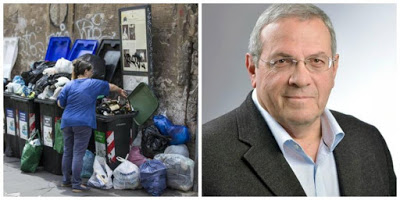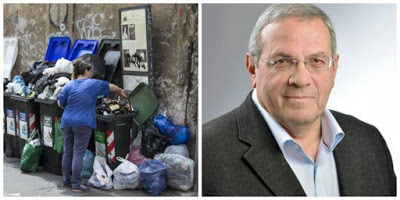While Cyprus has an obligation, under a European Directive, to promote waste sorting at source, only PMD, glass and paper materials are currently separated. Our country lags behind in the field of household waste separation, which, if implemented, will have tremendous benefits for the environment and the citizens themselves.
The Member of Parliament of the Ecologists 'Movement - Citizens' Cooperation Charalambos Theopeptou, who makes frequent interventions on this issue, spoke to KYPE, expressing his great disappointment and concern about the fact that Cyprus does not promote European directives.
Under the EU Directive 98/2008, Member States should promote sorting at source, and date and material should be set aside. At the same time, there are other guidelines for so-called biodegradable waste, so the effort is to separate the citizen at home as much material as possible.
"Currently in Cyprus, most homes have the option of separating PMDs (plastic containers, metal, juice and milk boxes), sorting glass and paper. I think it is necessary to start separating organic waste, ie kitchen waste, edibles, that it was once alive, a plant or an animal, because it decomposes in nature, we should separate it ", said Mr. Theopeptou.
He explained that in the process of simple composting we cannot place, for example, meat or spaghetti left on a plate, or other cooked food that eventually ends up with the rest of the waste. While if a special sorting was done, these wastes would go to separate units.
"These are specialized units that can do pasteurization, that is, they receive the material, pasteurization takes place and then it enters the melting pots. There is composting, but in anaerobic conditions, ie you do not mix the materials, but you seal them. Methane and other gases are then produced, which produce electricity and what is left is a very good quality topsoil, ”he explained.
Asked why we, as Cyprus, do not promote these units and why we do not train people to separate their household waste, the Member of Parliament for Ecologists-Citizens' Cooperation referred to the recent scandal with landfills / landfills.
"What worries me the most is that even though these things have come to light, we all know them, and despite the fact that anyone who asks about waste and knows what's going on in the EU knows that no one does these big factories. that we are doing to such an extent that we are not going to change our policy and continue to build illegal factories, ”he said.
Mr. Theopeptou stated that it turned out that there are interests in the selection of large factories. "It's all that saw the light of day, we're making big factories of specific specifications for a particular company to make," he said.
Asked about the sanctions that Cyprus may face from Brussels, Mr. Theopeptou said that as a state we have gone to Brussels too many times and there is correspondence. "The state has tried to convince the EU that nothing else can be done in Cyprus, because we have peculiarities. That is our excuse, "he said.
In short, that is, with the tolerance of Brussels, these factories are operating, we ask Mr. Theopemptos.
"I think tolerance is the right word to use, but we have a huge problem that will arise later and we have to see it," he said.
As Mr. Theopeptou explained to us, if the organic waste is not separated, that is, if I put the leftovers in the same bin as the household waste, all this household waste will end up in a factory like the one in Kosovo. There is a separation of certain materials (plastic, aluminum cans, etc.) and the residue that remains, ie soiled paper, leftovers, medicines, etc. is subject to processing and then we do not know what to do.
"The solution at the moment that we have found is that we are processing as a point, we are burying the rest but we will then proceed to find a way to burn them. And we will need another 300 million to make a burner, "he told us.
According to Mr. Theopeptou, we could not spend these 300 million (calculation that was made a few years ago), not to pollute the environment, to have benefits with energy production but also many permanent jobs scattered in Cyprus.
The Member of Parliament for Ecologists-Citizens' Cooperation explained that the executive has the sole responsibility for managing waste and it seems that the Government does not intend to change its policy.
"We have the right legislation, but its provisions do not apply. For example, we had to have mandatory recycling in 2015, but this thing was never implemented. We have other problems with green waste management. In other words, we are throwing away the pruning from houses, gardens, parks, etc., and we have violated all three dates set by the EU for compliance and for the quantities that had to be managed, "he said.
Asked what needs to be done from now on to comply with Cyprus, Mr Theopemptou recalled that when there was a public consultation on the management plan, the controversy was intense. Afterwards, many conferences, seminars were held, high-ranking officials of the EU Environment Committee came to Cyprus and spoke and stressed that it is not too late for Cyprus to change its policy.
"We insist on big factories. There are assumptions and police investigations show that the way the policy was done was to help a particular company. But we continue with this reasoning, "he said.
According to Mr. Theopeptou, the situation may change if we launch serious campaigns to teach people to compost vegetable waste at home first.
In this way, citizens will first see a 5-10% reduction in plant waste. These wastes (prunings, grasses) can then be collected in composting units and produced as a soil. He noted that because we do not comply with the relevant instructions, a plant for the production of pesticides in Nicosia is being closed.
"In the past, pruning was accepted, now no one enforces the law and it doesn't make sense for someone to load their pruning and get it there and so throw it in open plots and fields," he said.
Mr. Theopeptou explained that small spaces operate in neighborhoods abroad, precisely so as not to create disorder, where the residents place their prunings. In fact, these areas are semi-submerged areas so that they do not appear and are not disturbed, and pruning is then collected and led to the composting process.
"In Cyprus, there is no proper sorting, everything ends up in some factories, while in the process they could go to other smaller units and have a benefit in energy and soil," he said.
Mr Theopemptou also said that based on EU surveys, citizens are making the best choice in the source, ie they are distributing the highest quality materials, while if everything is collected in one place, in large factories, questions are raised about how we manage the materials that remain.
The cost of transporting a truck to the Kosovo plant from a poor community in the province of Larnaca or Famagusta once stood at 85 euros a ton, causing some to collect garbage and throw it in the fields.
“This creates the uncontrolled operation of garbage dumps, such as in Paralimni or Avgorou. In Paralimni we spent millions to restore the garbage dump, we sealed it and we continue and throw away the waste. We have failed miserably in the management of household waste and yet we continue with the same policy ", said Mr. Theopeptou.
He added that questions were also raised about the fact that while the Department of Environment should have been in charge of waste management, it was taken over by the Ministry of the Interior, which, according to him, does not have people specializing in waste management and has and just created the so-called waste sector with two or three staff members.
Mr. Theopemptou said that the sorting of household waste is an easy process for households because the citizens will simply install an additional basket, carefully selected, for the leftovers.
Asked about the incentive for households to allocate household waste, the MP explained that in other countries abroad all recyclable materials and leftovers are received free of charge. For mixed waste there is a charge for each bag collected.
Therefore, he explained, if the charge is, for example, 60 cents per bag, then the citizens will think twice and thrice and will try to reduce the volume of their waste.
Regarding the unit that was recently installed in the Mackenzie area of Larnaca for recycling and the provision of incentives to citizens (eg coupons for parking spaces), Mr. Theopeptou said that this is a very good idea for promoting recycling.
These systems, he said, also exist in some supermarkets abroad where customers are given the opportunity to recycle after their purchases (eg toothpaste packaging) and in return receive points on the supermarket card. He explained, however, that these are expensive systems and can only be installed for promotional purposes.
In relation to electronic and electrical packaging in Cyprus, Mr. Theopeptou explained that recycling works very well, but the problem is that people do not know about this process and need promotion and advertising campaign.
In most stores in Cyprus there are gray bins where citizens can place such devices. For phones, it is also possible to place them in special places in Cyta stores. Consumers are advised to reset their phone or make it useless so that there is no possibility of spying on personal data (eg photos) on the device.
Mr. Theopeptou also referred to the importance of reuse and prioritization in waste management. "It simply came to our notice then. The EU directive states that the most important thing is to take measures not to create waste, we have the legislation to prevent the creation of waste, but we do not use it, "he said.
Reuse is also important, according to Mr. Theopeptou, and that is why the operation of the so-called Repair cafes for electronic and electrical appliances, furniture repair shops, collection and sale of second-hand items, antique shops, etc. is equally important.
"It simply came to our notice then. We didn't promote it and that's why someone sees sofas, chairs, TVs thrown in open spaces in neighborhoods, "he said.
He said measures could be taken easily and simply not to dispose of these items in the fields and outdoors by advertising and promoting reuse networks.
"Municipalities have started sending garbage notices and could advertise on the same printed telephone numbers for those who want to throw away old furniture or appliances, these companies receive them and either sell them or give them to needy families and thus avoid the hassle and the mess, ”he said.
Mr. Theopemptou also said that many consumers do not know that when they buy a new electronic or electrical device by law, the company is obliged to pick up the old one.
Source: KYPE

